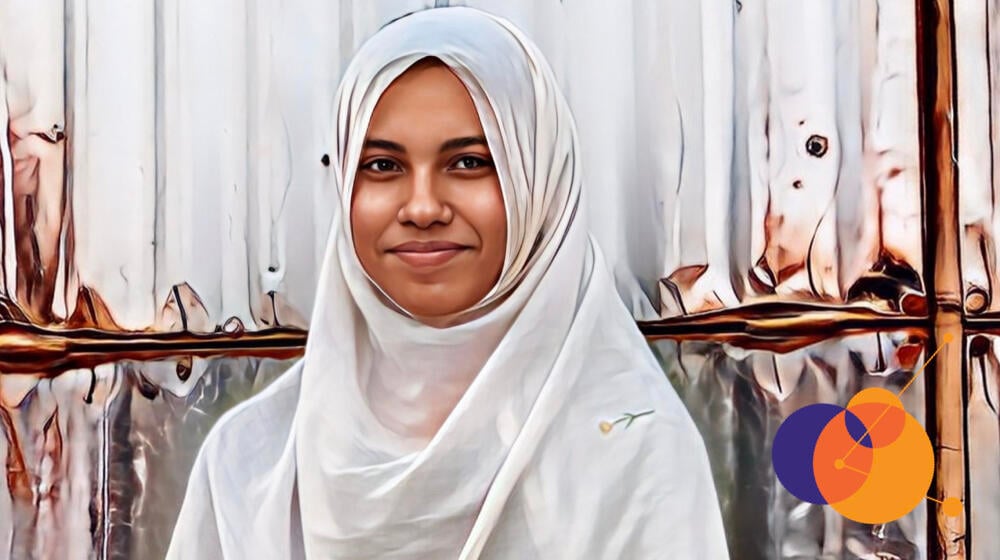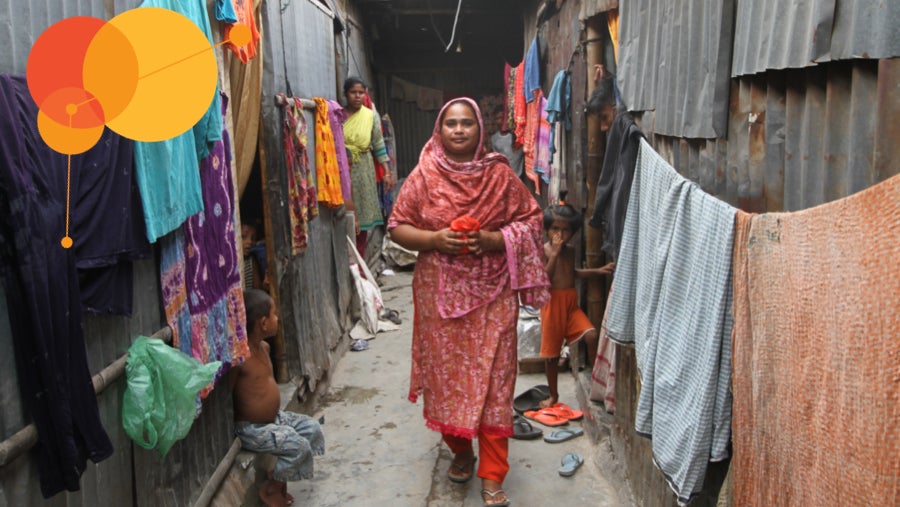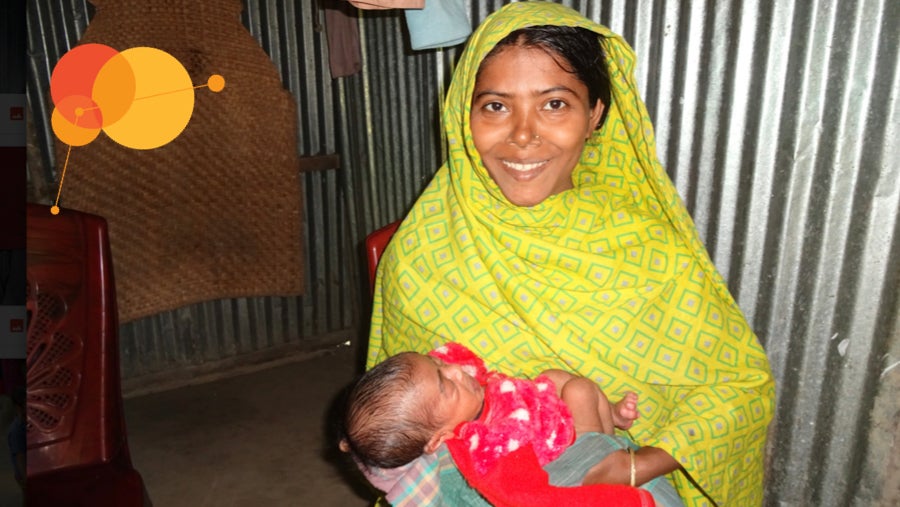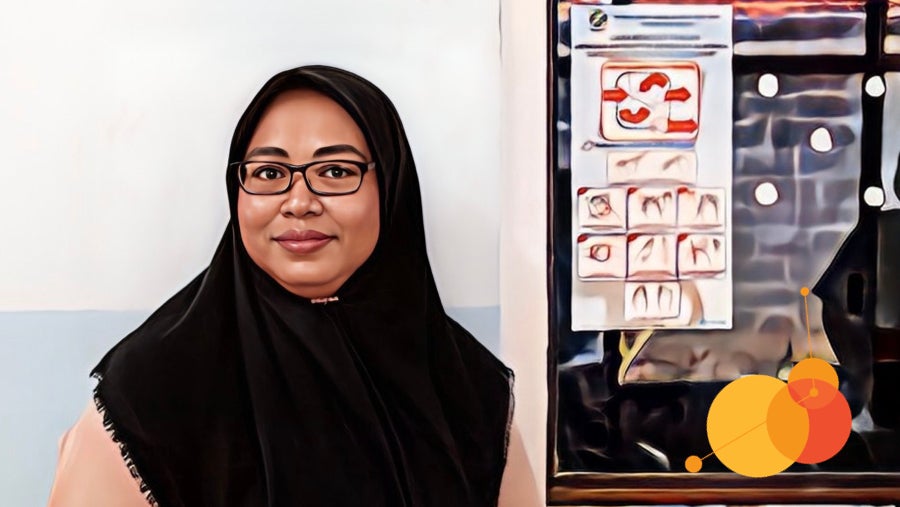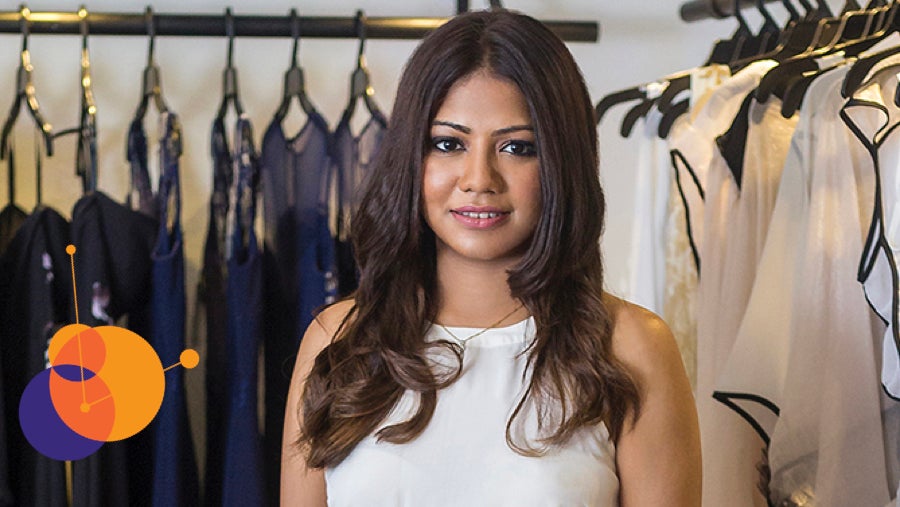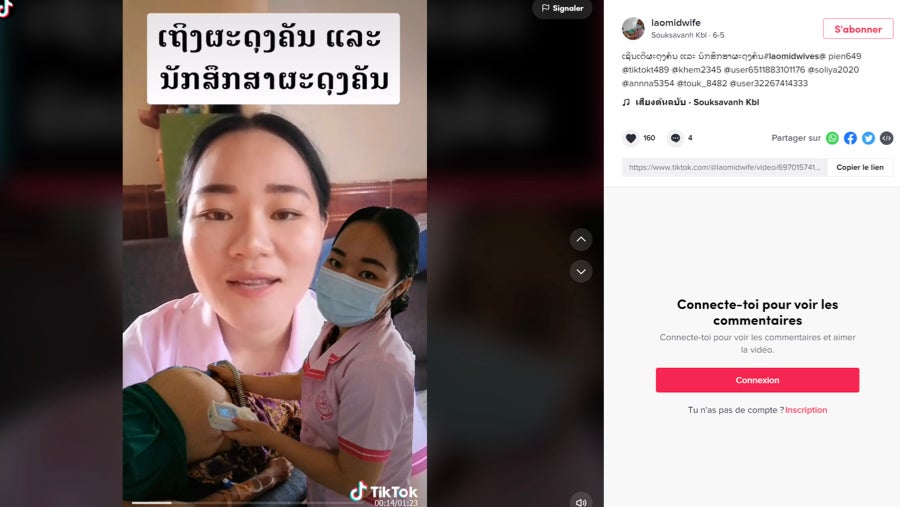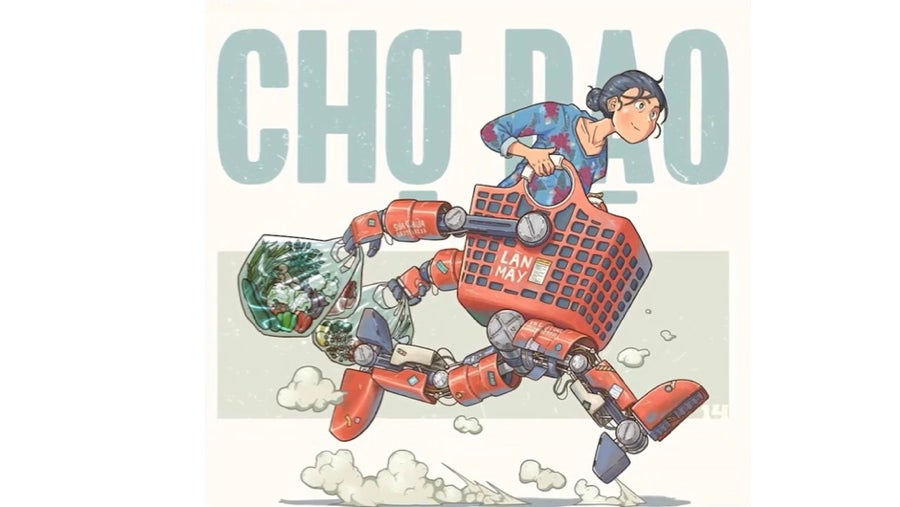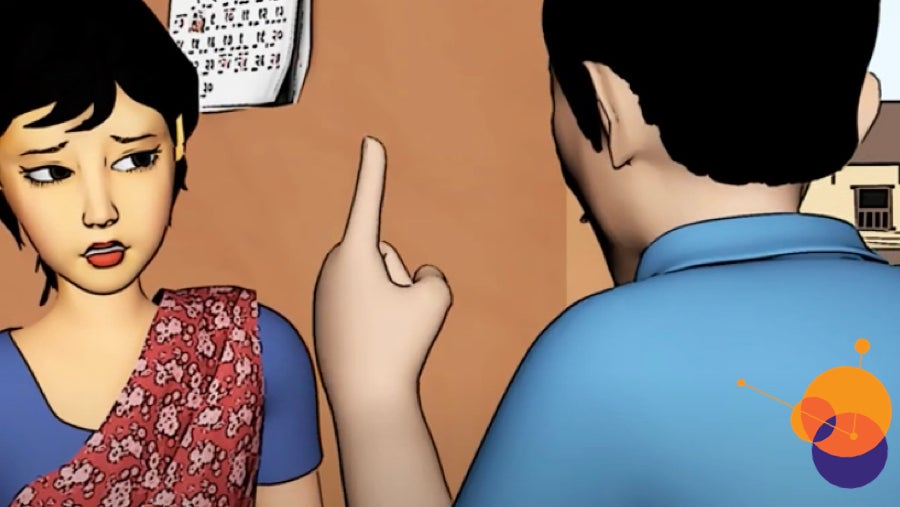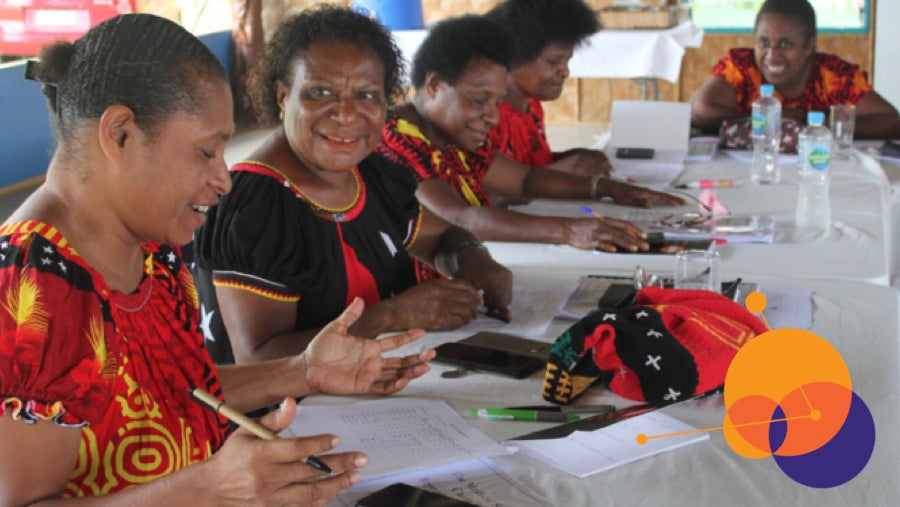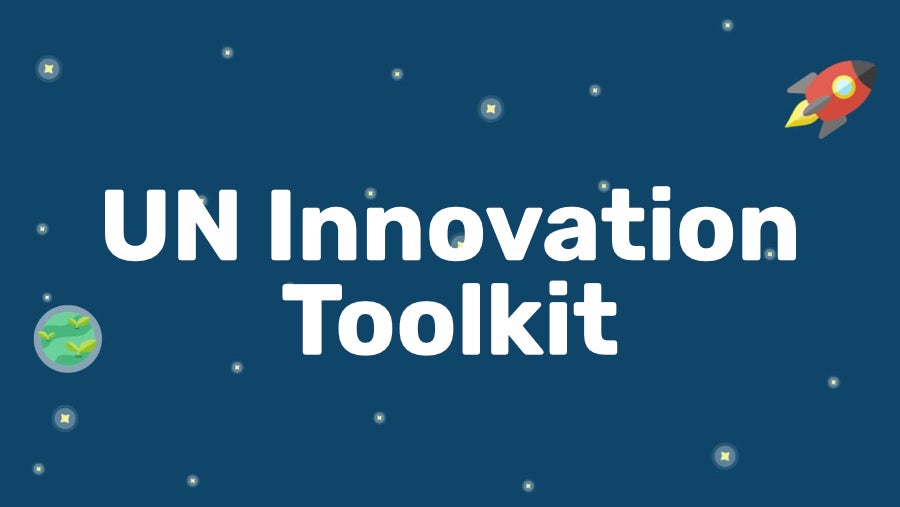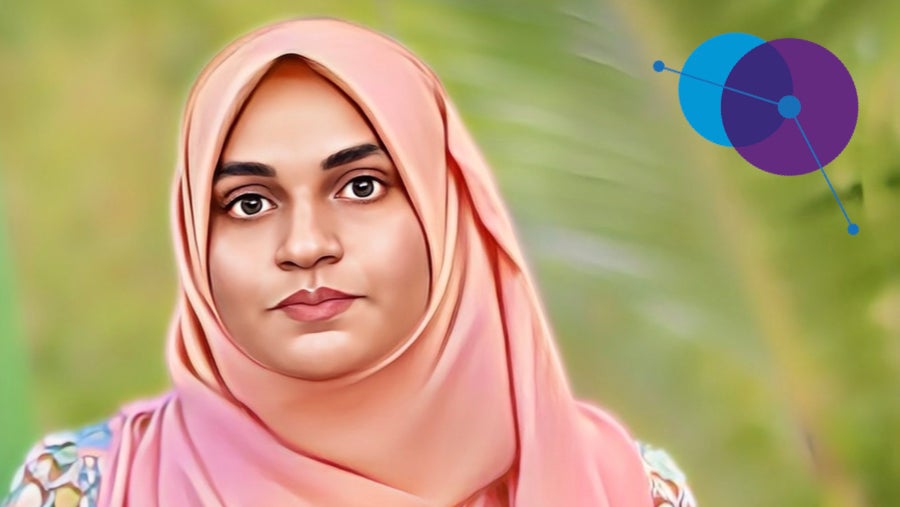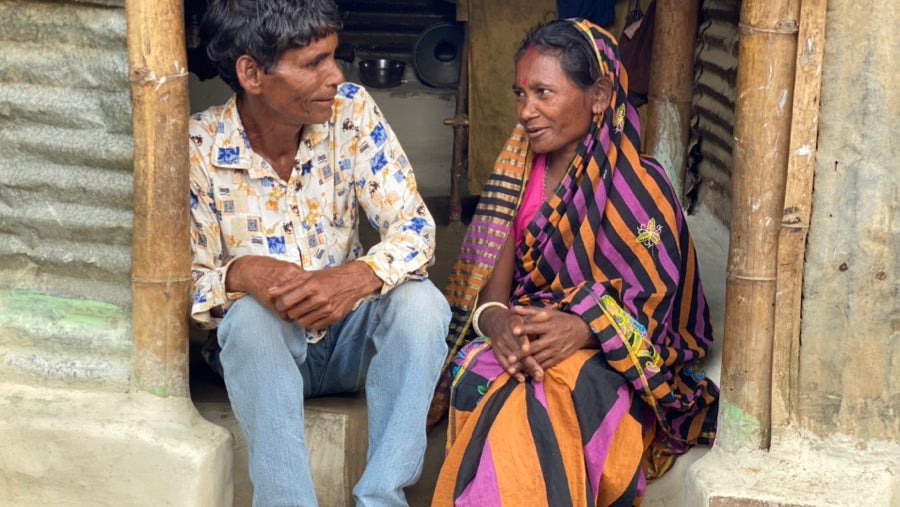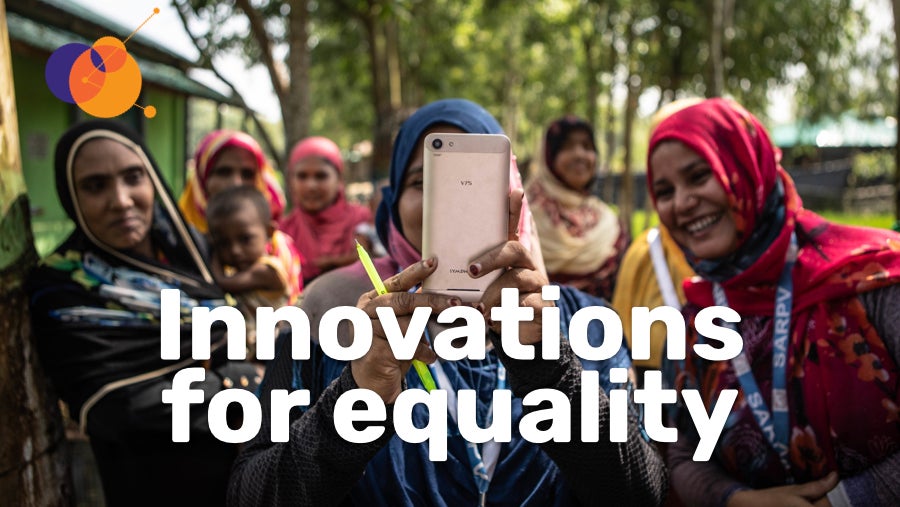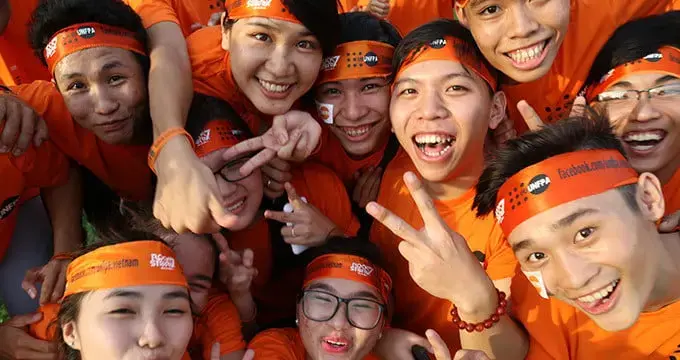This collection takes a look at innovations advancing the rights of women, girls and the most marginalised across the Asia-Pacific region. Using tools like blockchain and TikTok, the effort to uphold and expand fundamental rights like access to sexual and reproductive health and a safe birth is stronger than ever, thanks to innovators finding solutions to the unique problems in challenging contexts and converging crises.
Bangladesh: UNFPA and World Food Programme are piloting a digital platform using blockchain technology to deliver food, menstrual supplies and information through community shops in informal settlements in Dhaka. Each month, women and adolescent girls from targeted groups can redeem packets of disposable menstrual pads and food items from a shop near their home. The innovation fuses a cash voucher model with a local grocery purchase to empower women and girls with choices when it comes to their menstrual health. READ MORE
"We are distributing pads, but we are promoting the idea of pads to give girls an opportunity and choices and let them know there is another way to manage.”
-Iliza Azyei, UNFPA Bangladesh
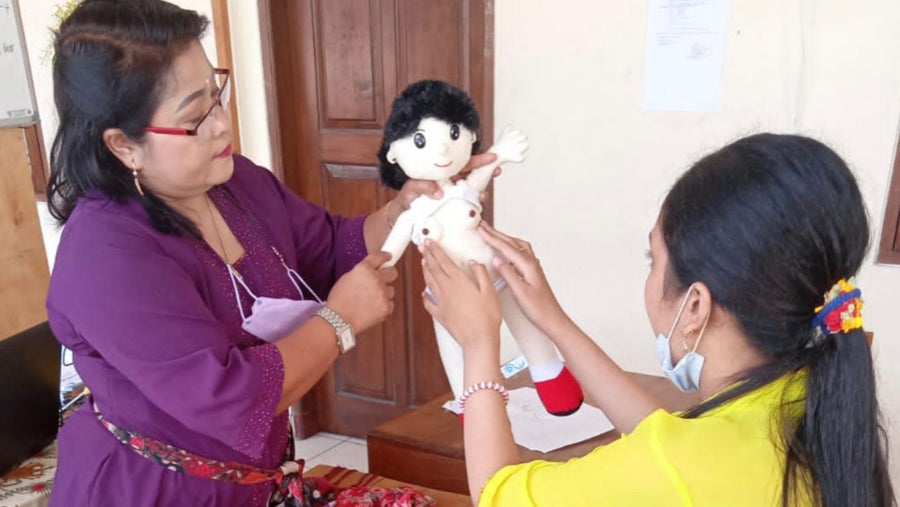
Indonesia: “Girls with intellectual disabilities, especially those with severe disabilities who require special needs school, often their parents do not even talk about menstruation at all,” says Sandeep Nanwani. He is the Programme Officer for Adolescent Sexual and Reproductive Health with UNFPA Indonesia. He worked on a program to train teachers to deliver a comprehensive sexuality education to students with intellectual disability, focusing on menstrual health and hygiene. So far the collaboration has trained 54 teachers in 11 provinces. READ MORE
“It was my first time learning how to teach these topics to people with intellectual disabilities so that students are fully supported as they go through puberty.”
-Tri, a teacher for students with intellectual disabilities in Jember, Indonesia
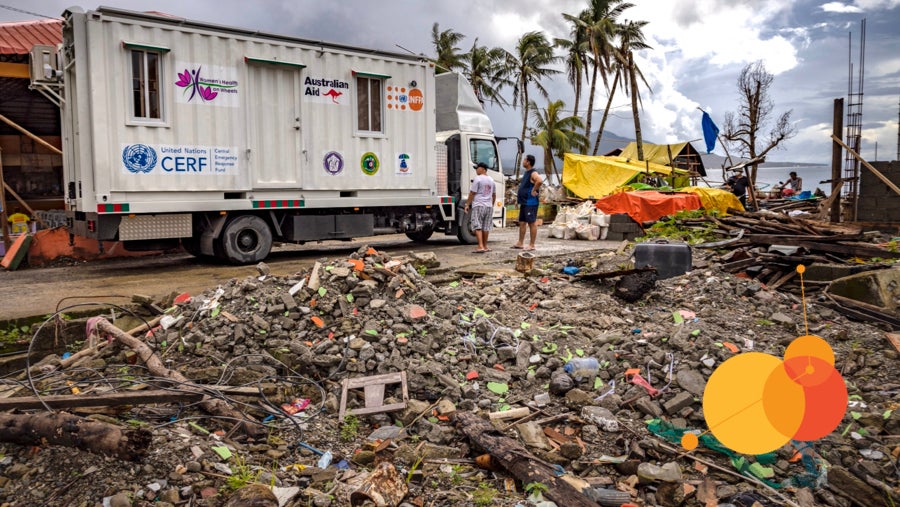
Philippines: Women’s Health on Wheels is a mobile birthing facility that provides maternal and reproductive health care for women when hospitals and rural health units are destroyed because of disasters. It supports basic emergency obstetric and neonatal care to assure safe childbirth in the aftermath of an emergency.
With its ability to be mobile, the truck can reach remote areas and provide rapid response to women in dire need. The mobile clinics were used in the response to Super Typhoon Rai which struck the Philippines in December 2021. Sustained maximum winds of 195 kilometres per hour devastated southern Leyte and health care infrastructure, leaving more than half a million displaced. READ MORE
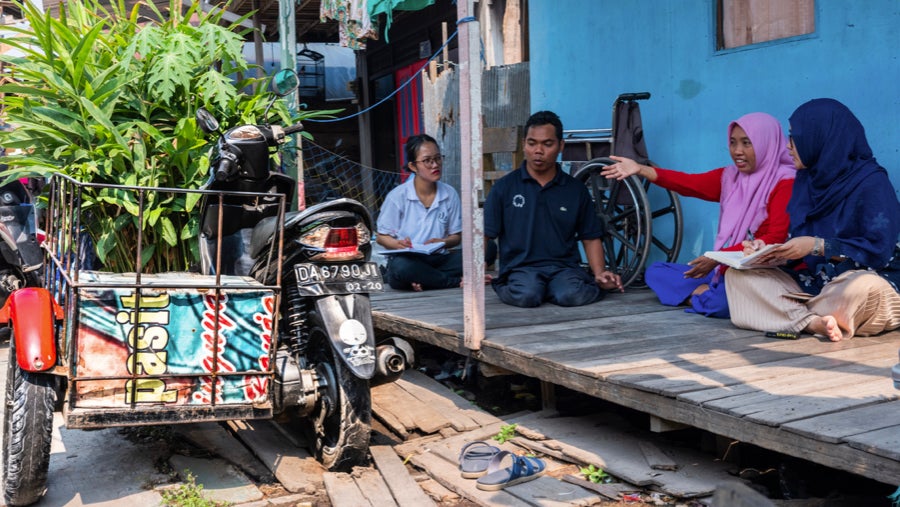
UNFPA has partnered with the Global Disability Innovation Hub (GDI Hub) to solve complex real world disability innnovation problems with practice ready evidence. GDI Hub is a research and practice centre driving disability innovation for a fairer world, which is part of a movement for disability justice to disrupt current ideas and practice to create new possibilities. The hub operates in 41 countries, with more than 70 partners developing bold approaches, building innovative partnerships and creating ecosystems to accelerate change. The parternship with UNFPA will strengthen disability innovation in the Asia and Pacific region leveraging global leanring and momentum.

Mongolia: One of the main challenges in the prevention of gender-based violence in Mongolia is to find ways to challenge harmful norms, including toxic masculinity and help both perpetrators and survivors find emotional expression as a substitute for violence or silence. Sport offers a safe space to channel energy, focus on the body, express and discharge stress. With martial art therapy gaining traction among rehabilitation mechanisms for survivors with projects like Fight For Dignity and the Panzi Model leading the way. But UNFPA has expanded to offer it to perpetrators and men of the community as well.
For survivors the focus is building self-worth, helping with emotions, and reclaiming your body using breathing exercises or linking physical movements to mental states. For perpetrators, the sessions are a chance to express feelings and emotions in a unique and positive way, in a safe environment. The project gives sessions to both boys and girls, to explore their strength by improving communication skills.
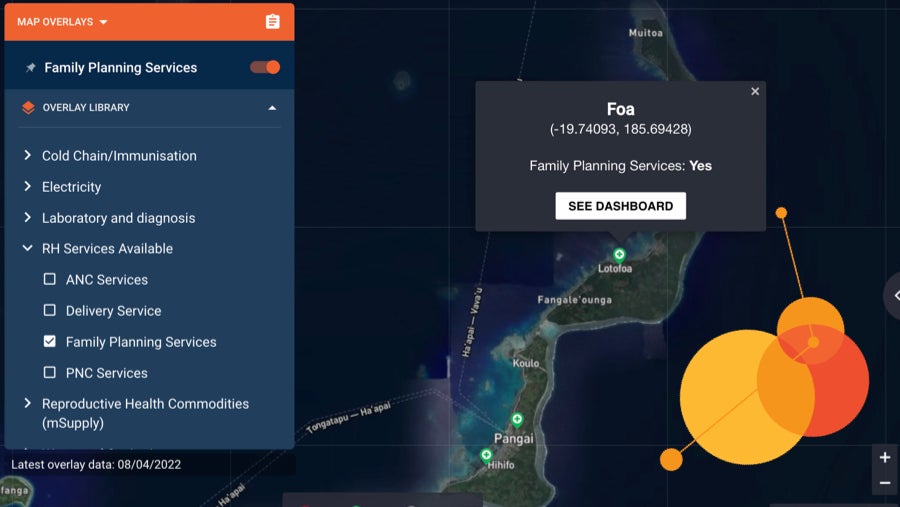
Pacific: UNFPA Pacific's effort to strengthen countries' capacity to collect, analyse and disseminate national data led to the development of the 'UNFPA RH Project: Pacific Regional Information on RH Commodities, Service Provision and Utilisation' which was launched June 2019 on the web-based ‘Tupaia’ platform. The project visualises data for eight countries in the Pacific. It is a tool for government institutions and development organisations to view reproductive health services and commodities and target services and resources to the areas of the greatest need, with a focus on commodity supply. LEARN MORE
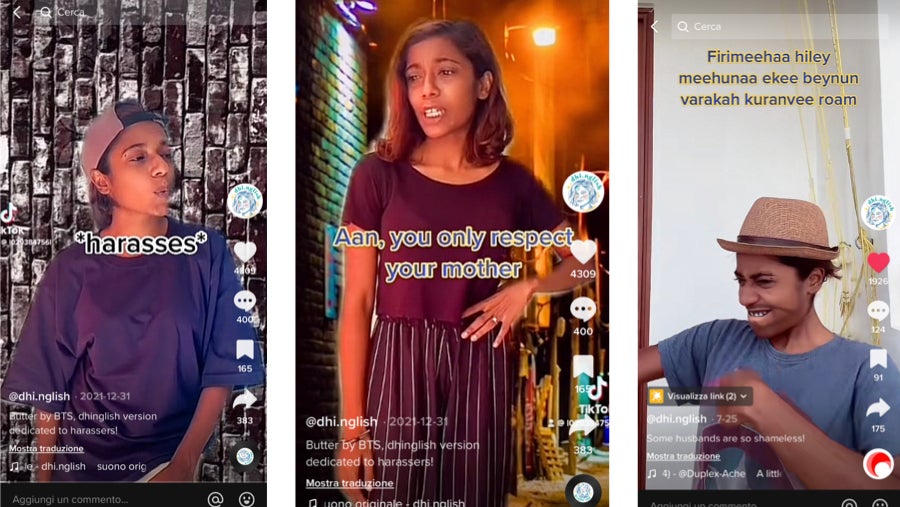
Maldives: UNFPA Maldives is finding creative ways to change the conversation about bodily autonomy and gender-based violence. A collaboration with influencer Afnan Ibrahim or Dhin.glish on Tiktok and Instagram has brought discussions into the mainstream. Her poems, skits and songs have resonated with large audience in Maldives and got people, especially young people thinking about harmful social norms around gender, masculinity, family planning, puberty and sexual violence. “Such projects focusing on digital advocacy can be the bridge to having conversations with young people,” says Afnan. LEARN MORE
Bangladesh: UNFPA Bangladesh supports youth volunteers by providing training and equipment to share the stories of women and girls affected by climate disasters. The initiative trained young people in photography to document stories of UNFPA's humanitarian flood response efforts in their villages. READ MORE
Indonesia: “When there is a disaster,” Oldri says, “we can change the platform into a model that can be adopted by the government to reach the most vulnerable and we can get people direct support with cash and voucher assistance.”
During the pandemic, Oldri Sherli Mukuan and her colleagues at UNFPA Indonesia started a cash assistance program that targets women and young people living with HIV and women partnering with people living with HIV. The economic impact of COVID-19 and the unique vulnerabilities of these population groups created new barriers to access health services. The initiative provides direct cash transfers to help people get to the health centres for life-saving HIV treatment.
For people living with HIV, the extra funds help ensure safety and security. “They feel secure even though they have no money because they lost income and are coping with unemployment during a pandemic,” she says. “But having the cash is really a guarantee for them to access services in crisis situations.”
Oldri recalls how she met a woman and her daughter who were both living with HIV. They attended a workshop and shared how the project helped them. “Having a household where multiple family members are living with HIV, the cash helped them as an economic lifeline during the pandemic. The mum contributes money from the grant to be used for her daughter's education by buying books for her to go to school.” READ MORE
“Having the cash is really a guarantee for them to access services in crisis situations.”
- Oldri Sherli Mukuan, UNFPA Indonesia
Sri Lanka: UNFPA Sri Lanka partnered with the Colombo Fashion Week to shine a light on the issue of gender-based violence. Designer Amilani Perera ‘s collection "With Her" was crafted in partnership with UNFPA Sri Lanka. The collection showcases our shared responsibility to provide care for survivors of domestic violence. It featured pieces with hand-drawn prints and handloom fabrics made by survivors of violence. The partnership shines a light on the prevalence of gender-based violence and raises funds for the shelters. It links shelters for survivors with designers to enhance their economic empowerment by developing new skills and connecting with the fashion industry in a positive way. LEARN MORE
Lao PDR: Lao PDR has one of the highest maternal mortality rates in the region. COVID-19 and lockdowns made things worse with increased early pregnancies and maternal deaths. Midwives were unable to reach women in mountainous regions and migrants who were crossing borders. Midwifery schools as all students returned to their towns for the lockdowns. UNFPA supported a project by qualified midwives to maintain training and continue providing maternal health and sexual and preproductive health services to women and girls, returning migrants and people in rural regions. They produced a series of engaging videos on TikTok to ensure women in remote areas could access accurate information and midwives could continue their learning, even during the pandemic. LEARN MORE
Viet Nam: UNFPA set up a virtual exhibition called "Girls deserve to shine," that displays photos and paintings chosen from 375 entries from 23 provinces. It showcases the contributions of women to family and society.. The exhibition tells stories about the daily lives of women of different ages, roles and occupations and highlights their devotion, hard work and contribution to their families and communities. Visitors can explore the virtual gallery or watch a guided tour in Vietnamese or in English. The exhibition raises awareness of the negative impact of gender-biased sex selection. LEARN MORE
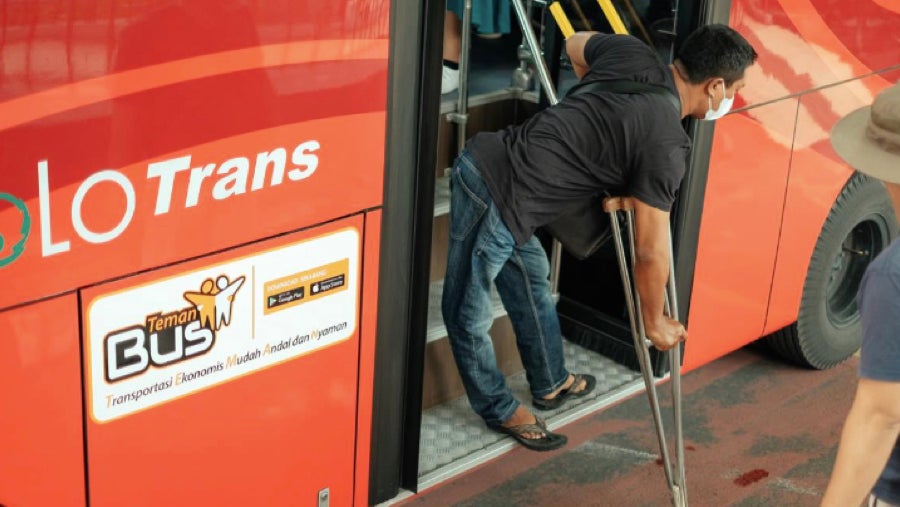
Indonesia: The Global Disability Innovation Hub (GDI Hub) did a case study as part of the Inclusive Infrastructure programme on Solo, Indonesia. The series of case studies will be analysed to develop a comparison report and a global action report that will offer evidence and recommendations that support making infrastructure, the built environment and urban development in low-resource settings more accessible and inclusive. The process helps builds a picture of the current state of inclusion and accessibility in the built environment and infrastructure in Solo through engaging local stakeholders and communities and exploring the understanding of and potential for inclusive design to address some of the current barriers to inclusion. LEARN MORE
“The kNOwVAWdata Initiative, which began in the Asia and the Pacific region was the genesis of UNFPA leading work globally around the generation and use of quality data to help inform policies and programmes,” says Alexandra Robinson, the Gender-based Violence Advisor from the Gender and Human Rights Branch at UNFPA. “It has been a spark behind UNFPA’s effort to make violence against women data accessible and available.” The Geospatial Dashboard on Intimate Partner Violence is an open source platform that helps governments, researchers and service providers use data to better understand the connections between gender-based violence, poverty, education and SDG indicators related to UNFPA’s mandate. The platform uses disaggregated data on a sub-national level and illustrates key socio-demographic characteristics of violence. LEARN MORE
Papua New Guinea: “These workshops are designed to strengthen systems that allow the procurement, distribution, quality storage and safe usage of essential medicines and medical devices in particular, reproductive health commodities,” says Debbie Kupesan from UNFPA PNG. The training is part of a wider project designed to bridge the gaps in the medical supply chain. It includes practical tips and examples on procurement from international manufacturers and suppliers, effective national and sub-national medical stores, distribution to different levels of health facilities, and stock management at dispensaries at hospitals and health centres. “The goal is to help health workers understand how the medicines ordering system works in PNG and understand the importance of their role as part of the team involved in the supply chain,” Debbie says. LEARN MORE
As the United Nations faces a number of pressing issues, it is time to make innovative thinking the new normal. Developed by the UN, for the UN, this digital platform includes twenty-one tools, step-by-step directions, worksheets, case studies, references as well as a 27-question assessment which provides a diagnosis on every user’s strengths and areas for improvement. Upon request of the UN Secretary-General, the UN Innovation Toolkit was developed under the leadership of the UN System Chief Executives Board for Coordination (CEB) in close collaboration with the UN Innovation Network and innovators from 30+ UN Entities. The toolkit has been entrusted to UN System Staff College (UNSSC) to ensure dissemination and integration into relevant capacity building and innovation efforts. LEARN MORE
Maldives: Hamsha is the founder of Zero Waste Maldives and one of the leaders of Cupvert, an project that raises awareness about the benefits of reusable menstrual cups through discussions with women and girls. “Cupvert aims to introduce sustainable menstrual health products,” Hamsha says. “At the same time we are providing information about reproductive health.” What began as a pilot in 2019 on Laamu atoll now has increasing numbers of people switching to cups and adopting climate-friendly menstrual hygiene practices, paving the way for scaling up across the country. READ MORE
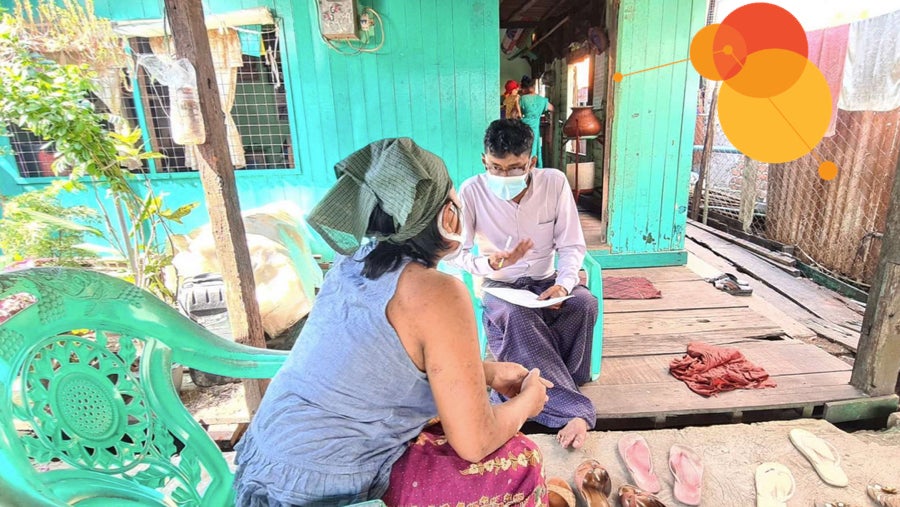
Myanmar: A project providing cash transfers for sex workers and other vulnerable populations expanded in 2021 and 2022 into Southern Shan State in eastern Myanmar, as well as the scope to reach vulnerable groups including men who have sex with men, trans people and female sex workers.UNFPA support for static and mobile clinics helped expand access overall to services in these areas. This year, more than 900 sex workers in southern Yangon and 1,050 men who have sex with men, trans people and sex workers in southern Shan will receive two cash transfers each. The project helps everyone involved get improved access to sexual and reproductive health services.
Bangladesh: Bangladesh reached a milestone in December 2021 declaring Panchagarh district “Obstetric Fistula Free.” The collaborative approach focuses on increasing identification and diagnosis of cases, coordinated referral management and improved rehabilitation services for fistula survivors. READ MORE
In a rapidly changing world, UNFPA needs dynamic solutions to meet the needs of women and girls and deliver sexual and reproductive health and rights (SRHR) for all. We must embrace innovation to deliver on our three transformative results to end preventable maternal deaths, end unmet need for family planning, and end violence gender-based violence and all harmful practices, including female genital mutilation and child, early, and forced marriage.
The UNFPA Innovation Fund has investments under four innovation thematic priorities—digital health, SRH commodities, data, and innovative finance. The fund supports small to medium innovative ventures which test, rapidly prototype, pilot, and transition to scale new solutions through the Innovation Pipeline, alongside big signature initiatives to create “global goods” for the development community on a wider scale. This publication of stories from across the Asia Pacific region illustrates how UNFPA and partners are innovating to meet the needs of women, girls and the most vulnerable. READ MORE
Learn more
Global Disability Innovation Hub
Disruptive Innovations for women and girls

